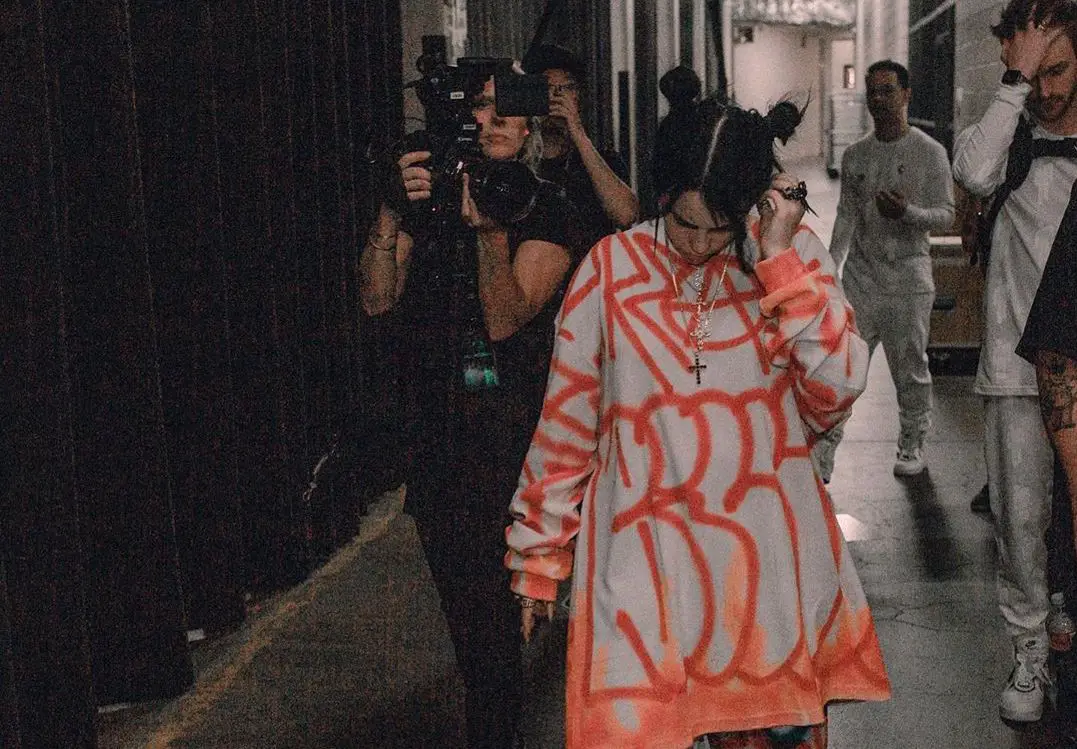Just three years ago, few people, if any, would have recognized the name Billie Eilish. Now, however, with 24 million Instagram followers, 14 million YouTube subscribers and several record-breaking Billboard records, Eilish is one of the most well-known names in the music industry and her popularity continues to grow.
Eilish is setting new records for young artists as well as women in the music industry. Her debut album, “When We All Fall Asleep, Where Do We Go?” became the No. 1 album on the Billboard 200 albums chart, and after Ariana Grande’s “Thank U, Next,” Eilish’s debut album’s sales were the second-biggest of the opening week of 2019. Like Eilish herself, the majority of her fanbase is young teenagers. Her candidly morbid music, baggy, shapeless, gothic style, and bored-looking, never-smiling face in pictures, all make her stand out from the Hollywood status quo, and her fans love her for it.
“I never want the world to know everything about me,” says Eilish in a Calvin Klein advertisement on her Instagram page. “I mean, that’s why I wear big, baggy clothes. Nobody can have an opinion because they haven’t seen what’s underneath,” she says.
https://www.youtube.com/watch?v=JeMmUglv6wA
Her androgynous style makes Eilish an anomaly in the world of teenage pop stars. By refusing to allow the industry to sexualize her 17-year old body to get to the top of the charts, she stands out from other female Hollywood artists. She has, nonetheless, managed to rise to the top of of those charts.
Eilish is nothing short of a force of nature in her music, as well as how she chooses to be involved in the development of her career. She manages her own Instagram page and video content. She is her own stylist and she writes her own music with her brother.
When she could just as easily have other people take care of everything for her, she instead has some form of control in almost every area of her career. She insists on being directly involved in her career and the content that gets published to her fans. Why? “I’m not that kind of artist,” Eilish said in an interview with The New York Times. “And I’d rather die than be that kind of artist.”
Eilish’s direct involvement in the content she puts out to her fans makes her that much more relatable and seemingly reachable to her young audience. It helps her seem more connected to the average teenager, even though she’s a world-famous artist, touring the world with her music and posing on the cover of countless noteworthy publications.
At 17, she’s been on the cover of Elle, TeenVogue, Garage and has had a profile done by The New York Times and The Washington Post, among other publications.
Her fans see someone worth looking up to. She’s equally passionate about her music as she is about her fans. She makes that passion known through her Instagram page, where she often posts excerpts from her concerts and describes how thankful she is for her fanbase.
Eilish is also open about her mental health struggles. Because she is a public figure, Eilish has been open with her fans about her struggles with depression, anxiety, night terrors and sleep paralysis.
In a recent “Seize the Awkward” video about mental health and friendship, Eilish said, “It doesn’t make you weak to ask for help. It doesn’t make you weak to ask for a friend, to go to a therapist. It shouldn’t make you feel weak to ask anyone for help.” The video was meant to encourage viewers to seize any seemingly awkward opportunity to ask their friends about how they’re doing and to let them know they are there as a support system.
Eilish’s vulnerability creates a strong connection between her and her fans, as their generation, generation Z, has been reported to struggle more with mental health than any generation beforehand.
The American Psychological Association conducted a study on stress and its impact on Gen Z. The study concluded that “91 percent of Gen Zs between ages 18 and 21 say they have experienced at least one physical or emotional symptom due to stress in the past month compared to 74 percent of adults overall.”
They are the least likely to say that their mental health is excellent, or very good, but they are the most likely to seek treatment from mental health professionals. These statistics are compared to the millennial, Gen X, and Baby Boomer generations. Forty-five percent of the interviewed Gen-Z population reported excellent or very good mental health, compared to 56 percent of millennials, 51 percent of generation X and 70 percent of baby boomers.
Perhaps one of the biggest reasons young people idolize Eilish is because of her unwavering authenticity. Hollywood hasn’t changed her; she changed Hollywood.
Despite her quick rise to fame, Eilish has not allowed fame to change her. She doesn’t pretend to portray the perfect pop-star life. Instead, she remains herself, and the indifferent persona that she presents to the world resonates with her young audience.
Not only is this because of a stereotypically rebellious teenage phase, but can also be attributed to a generational characteristic. According to the consulting firm Ernst and Young, who conducted a profile on Gen Z, one of the most defining characteristics for the generation, which includes people born between 1996-2012, is independent self-sufficiency.
The inspiration that she provides, that anyone can make it in Hollywood, reflects her generation by exhibiting power through vulnerabilities.
Eilish is a misfit popstar. She is unconventional in her music, in the way she dresses and the image she presents to the world. In a society where teens are constantly struggling with feelings of inadequacy, low self-esteem and self-deprecation, Eilish provides hope that misfits too can reach their dreams and take control of their lives.
And who hasn’t felt like a misfit at some point in their life?
















